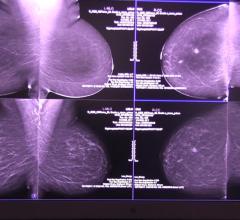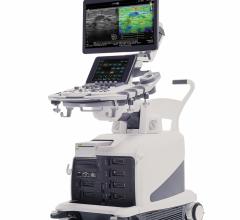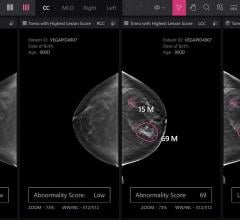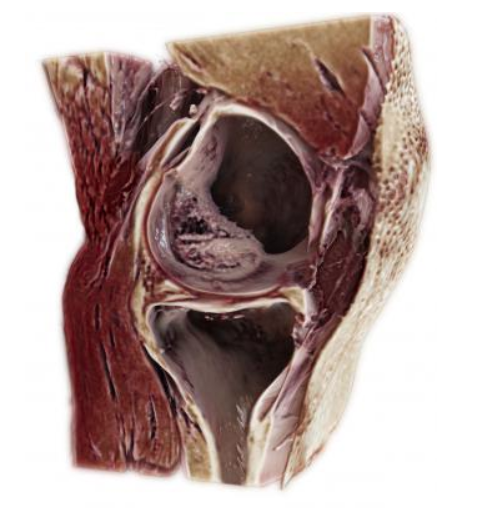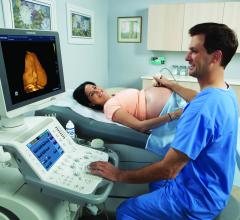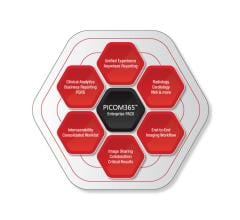Myth: Legacy PACS systems in an M&A environment can not support a global worklist. Fact: You can still have a global ...
Martin Yaffe, Ph.D., FAAPM, senior scientist, physical sciences/imaging research, Sunnybrook Health Sciences Centre, and ...
Ikonopedia and Konica Minolta Healthcare Americas Inc. showcased integrated breast imaging workflow and reporting at the 103rd Annual Radiological Society of North America (RSNA) meeting, Nov. 26-Dec. 1 in Chicago.
Radiology departments have many different needs and face a wide variety of challenges that can impact their departments ...
Hitachi Healthcare exhibited their latest premium ultrasound system, the Arietta 850, at the 2017 Radiological Society of North America (RSNA) Annual Meeting, Nov. 26-Dec. 1 in Chicago. The system, which received U.S. Food and Drug Administration (FDA) 510(k) clearance in November, offers a collection of features designed to improve image quality, speed workflow and extend the utility of ultrasound in radiology departments. Arietta 850 also supports what Hitachi calls the world’s first widely-available probe that uses capacitive micro-machined ultrasound transducers (CMUT) rather than piezoelectric crystals to transmit and receive the ultrasound signal.
December 5, 2017 — Advanced magnetic resonance imaging (MRI) of obese adolescents found disrupted connectivity in the ...
Stamatia Destounis, M.D., FACR, associate professor, University of Rochester School of Medicine, attending radiologist ...
Despite decades of progress in breast imaging, one challenge continues to test even the most skilled radiologists ...
December 4, 2017 — Ambra Health recently announced a new relationship with Google Cloud. As a Google Cloud Technology ...
Toshiba Medical, a Canon Group company, introduced its newest magnetic resonance (MR) system, the Vantage Elan/Zen Edition 1.5T, to deliver comfortable, effortless and efficient exams in healthcare facilities of all sizes. The Zen Edition prioritizes intelligent workflow and patient comfort, providing clinical applications to help providers make accurate diagnoses.
Here is the list of the most popular articles and videos on the Imaging Technology News (ITN) magazine website from the ...
Bayer Radiology’s Barbara Ruhland and Thom Kinst discuss how radiology departments can address the many different ...
December 4, 2017 — Fujifilm Medical Systems U.S.A. Inc. announced the expansion of the company's artificial intelligence ...
Toshiba Medical, a Canon Group company, introduced new educational tools and interactive learning resources to help healthcare providers stay current on CMEs and clinical education without impacting busy schedules. The new advancements give clinicians more accessible and mobile-friendly resources and accreditation opportunities that fit into their on-the-go schedules.
Philips recently announced the results of a comprehensive, independent, two-year study demonstrating the clinical workflow benefits of its next-generation image-guided therapy platform, Azurion. The study investigated nearly 800 patient procedures to evaluate the impact of Azurion at St. Antonius Hospital in Nieuwegein, the Netherlands. The data demonstrated clinicians’ use of Azurion resulted in significant time savings for the hospital, including a 17 percent reduction of the average interventional procedure time, a 12 percent reduction of in-lab patient preparation time, and a 28 percent reduction of post-procedure lab time.
eHealth Saskatchewan plays a vital role in providing IT services to patients, health care providers, and partners such ...
Materialise and Formlabs are collaborating to deliver a complete, cost-effective and easy-to-use solution for hospitals looking to start an in-house 3-D print lab. The new offering combines the Materialise Mimics inPrint medical imaging software with Formlabs’ Form 2 professional-grade desktop 3-D printers. The components of this complete 3-D printing package facilitate the implementation of patient-specific care at an affordable price-per-print for quick return on investment.
Vital Images unveiled the newest version of Vitrea Advanced Visualization software, the cornerstone of its imaging platform, at the 2017 Radiological Society of North America (RSNA) annual meeting, Nov. 26-Dec. 1 in Chicago. The new release, dubbed Version 7, includes numerous product enhancements and state-of-the-art modality applications.
December 4, 2017 — Change Healthcare and Zebra Medical Vision announced an agreement to create solutions that deliver ...
The importance of quantitative analysis in breast imaging was the focus of numerous abstracts accepted for presentation at the 103rd Annual Radiological Society of North America (RSNA) meeting, Nov. 26-Dec. 1 in Chicago. Four abstracts highlighted the use of Volpara Solutions' quantitative analysis tools for breast imaging. The tools provide actionable quantitative metrics for clinicians, including volumetric density, personalized dose, potential high risk, and other factors designed to maintain accuracy and drive consistent quality in breast screening.
ScImage Inc. introduced PicomPassport at the Radiological Society of North America’s 103rd Annual Scientific Assembly, Nov. 26-Dec. 1 in Chicago. PicomPassport is a new technology that leverages PICOM365’s Azure-based Cloud to simplify the importing of external patient exams into any picture archiving and communication system (PACS).
November 29, 2017 — Philips announced the introduction of IntelliSpace Enterprise Edition for Radiology, its ...
November 28, 2017 — Hologic Inc. announced it has signed a development and distribution agreement with Clarius Mobile ...
November 28, 2017 — Fujifilm Medical Systems U.S.A. Inc. displayed the all-new FDR Go Plus version portable digital ...


 December 06, 2017
December 06, 2017 
